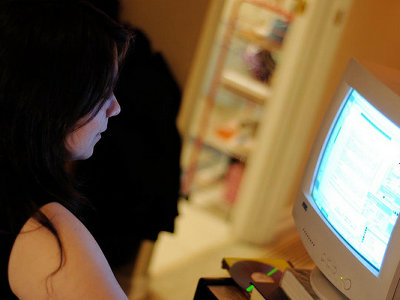From the photograph posted on Instagram AI appearance judging with posting accuracy "70%" above the human doctor "whether depression" or not

ByNaomi August
A lot of user's private pictures are posted on SNS such as Instagram, Facebook, Twitter, etc. Analyzing them, artificial intelligence succeeding in specifying "whether depression is depression" with 70% accuracy (AI) has appeared. According to researchers involved in the survey, the photographs of people in depressed state tend to be "darker, gray, bluish," and depression patients are "The world looks grayAlthough there are research results that show that the world looks gray through photos as well.
Instagram photos reveal predictive markers of depression | EPJ Data Science | Full Text
https://epjdatascience.springeropen.com/articles/10.1140/epjds/s13688-017-0110-z

Depression quite literally colors Our view of the world and leaves us feeling blue, according to new study | The Independent
http://www.independent.co.uk/news/science/depression-colour-blue-instagram-filters-social-media-university-vermont-research-study-a7882166.html
Instagram Can Identify Depression Better Than Doctors, Study Says | Fortune.com
http://fortune.com/2017/08/08/instagram-depression-doctors-study/
An experiment to judge whether the person who posted from the picture posted on Instagram is depression or not was done. We were able to identify the people of depression from the photos posted on Instagram with 70% accuracy using the AI in the experiment. On the other hand, the physician has a success rate at the time of the diagnosis of depression is that of the 42%, you can see well whether you identify the people of AI is how accurately depression.
Scientists who made a strange study of identifying depressed people from the Instagram posted photos provide a flexible on-demand workforce within the cloudAmazon Mechanical TurkI asked volunteers who wanted to share Instagram 's feed and spiritual medical history. The number of subjects was 166, and a total of 43,950 photographs were analyzed. In addition, 71 of 166 subjects were diagnosed with clinical depression in the past 3 years.
AI analyzing images seems to be programmed based on psychological research results on brightness, color and shading. Specifically, AI comparesHSVvalue. HSV refers to three elements of Hue, Saturation, Chroma, Value, Lightness, and Brightness. The picture on the right has a higher hue, lower saturation, lower lightness than the photo on the left, and the photo to be posted to Instagram by depression patients is of HSV value closer to the picture on the right than the picture on the left It is said that there is.

Professor Chris Danforth of the University of Vermont, who led the survey, said, "This survey is not yet a diagnostic test nor has it been done over the long term, but a new study to help depressed people It has become a proof of concept to confirm the method. "" We are looking for new ways for early screening for depression and new psychosis. "
Professor Andrew Lease of Harvard colleague Dan Force colleague said, "When pixels of our data set photo is pixel analyzed, people in depressed state in the subject are more likely to have blue or gray on average than healthy people It is strong. " On the contrary, healthy people tended to use Instagram's filters that process photographs in warm and bright colors like "Valencia". The most popular filter among those in depressed state is to convert photos called "Inkwell" to monochrome.

In addition, it seems that people who have been diagnosed as "sad" in their mental state tend to post pictures with fewer faces reflected per photograph than people diagnosed as "happy". This suggests that a decrease in social interaction may be associated with depression and researchers say, "It reflects the fact that people with depression take more self-taking," . However, the hypothesis concerning "sad" and "self-taken" is still unverified, "it is written in the paper, and it is clear that further investigation is necessary from now on.
As part of the research, efforts were also made to volunteer people to distinguish posted photos of depressed patients and healthy volunteers Instagram. According to Professor Danforth, even in a friend who knows exactly the subjects more clearly than the computer in this survey, it seems that we could not distinguish between depressed patients and healthy people well as we thought.
Furthermore, if you are diagnosed with depression from photos posted on Instagram, there is a possibility that it will become possible for physicians to be involved in a relatively light symptom. However, Professor Danforth asserts that it may cause ethical and moral problems concerning privacy if it does so.
Related Posts:
in Science, Posted by logu_ii







